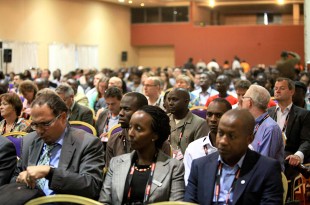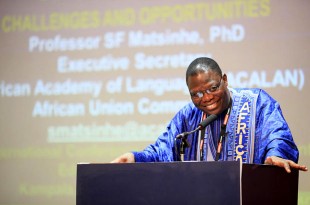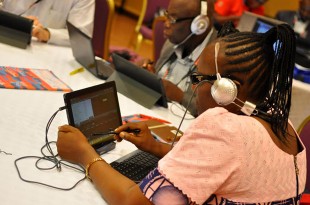Last month I attended e-Learning Africa in Kampala, where I presented the emerging findings from DFID's forthcoming Educational Technology Topic Guide. Now in its 9th year, the conference brought together 1,500 participants from 69 countries - African ministers sat alongside representatives from technology giants, donors, universities, foundations and NGOs.

Gathering such a wide variety of stakeholders in one place to share ideas, learn about new educational technology (edtech) initiatives and discuss key issues around their impact, challenges and possibilities is certainly an impressive undertaking, and critical in a field that relies on partnership and innovation.
During the 2 day conference, I learned a lot. In particular, I was struck by Professor Sozinho Franciso Matsinhe's keynote which focused on the role of linguistic equity in e-learning.

Professor Matsinhe argued that most e-learning content is written in one of the former colonial languages. Therefore it is not informed by the socio-cultural reality experienced by most Africans, creating a significant barrier to access, particularly for marginalised groups. He proposed a radical rethink in which former colonial languages partner with indigenous languages to extend access to, and quality of, online content.
Equally, I was intrigued to hear about the innovative ways War Child ambassadors used and profited from technology in post-conflict Uganda. Ambassadors combined the use of 'old' technologies, such as radio programmes targeting the youth, with training in how to use newer technologies such as computers. The ambassadors made clear that with the right support and motivation, edtech can provide an entrepreneurial springboard for young people to engage, connect and earn. Notably, this was the only session that gave voice to a group of students who have benefitted from technology in a remote, infrastructure poor environment.
I was impressed by 2 companies showcasing their products in the Exhibition Centre: Lifeline Technologies and iSchool. Their products seemed more affordable than many of the others that were on show, and they had tested them with students from economically marginalised backgrounds.
Lifeline Technologies make interactive radios which can be used by teachers to supplement and invigorate their classroom instruction. With a compelling evidence base and at $40 per radio (for the version not MP3-enabled), Lifeline are producing affordable technology that is user-friendly, robust and appropriate for rural contexts.

iSchool deliver a model that prioritises interactive pedagogy and uses a tablet as one tool of many to improve teaching. The tablet is loaded with digital content mapped to the national curriculum, and is available in both English and local languages. iSchool have tested their product in Zambia and are now looking into partnerships in other African countries.
However, these examples aside, there was a conspicuous lack of affordable technologies designed for the contexts experienced by the most marginalised – those living in rural and remote areas with limited electricity or connectivity, people with disabilities or with low literacy rates, women and girls – and an equally conspicuous lack of robust evidence on what works.
As such, zeroing in on the challenges surrounding infrastructure, my favourite comment of the conference was 'Do these devices run on charcoal?' made by an exasperated audience member in response to a session emphasising the transformational role of hardware.

This comment captured the main limitation of the conference: most of the discussions exploring how to use edtech were divorced from the reality facing most African students. Presentations predominantly focussed on showcasing the latest ICT hardware, with limited exploration of the evidence behind them, or their impact on teaching and learning. Even less attention was paid to cost considerations, infrastructure challenges, equity and socio-cultural issues.
For me, this underlines more than ever the importance of generating and disseminating high-quality evidence that explores the relationship between edtech, teaching and learning. Further, there needs to be increased transparency around the cost-effectiveness of interventions right from the design stage, with accompanying evaluations that include cost-benefit analyses. I only attended one session that focused exclusively on exploring the challenges encountered during implementation of an initiative using mobile phones in Kenya and Tanzania – I appreciated that the presenter shared this so openly!
Next year, I would like to see more sessions that explore the most effective ways to integrate e-learning in Africa and the challenges associated with doing so, drawing directly on the evidence, as well as best and worst practice.
This post was co-authored by Grace Wood, Education Policy Officer at DFID and Rosalind Gater.
Keep in touch. Sign up for email updates from this blog, or follow Rosalind on Twitter.

4 comments
Comment by Ray Harris posted on
Thanks for the update on some e learning initiatives -I like your focus on the use of new technologies that are relevant, appropriate and cost effective for rural and isolated communities.
Perhaps DFID could host their own Southern Africa technology event with the emphsis on the points you mention -small scale income generation and educational use of technology.
Comment by Stephanie Gering posted on
I liked this article immensely for focus on the use of new relevant technologies for the African environment.
Comment by Phil Goodwin posted on
Thanks for an insightful blog Rosalind - and not just because we get a mention. Couldn't agree more with your sentiments about appropriate technology and the need for better consideration of the whole solution, not just the sexy technology components.
Comment by Simon Wright posted on
I can't wait until even remote areas of Africa like South Sudan are fully connected to the internet, and are able to learn with the same levels of ease as here in the first world. We just need a technology company such as Apple to innovate and create a tablet that can be manufactured at a fraction of the cost.